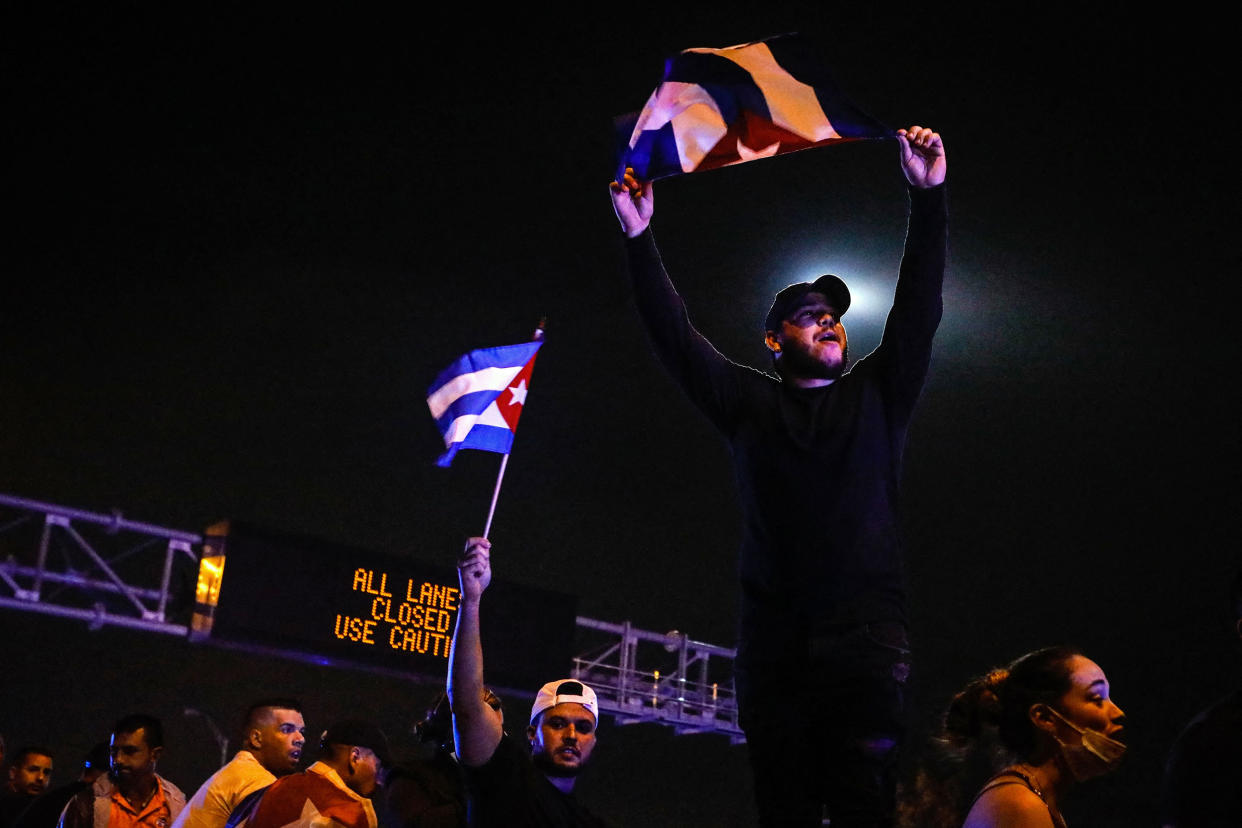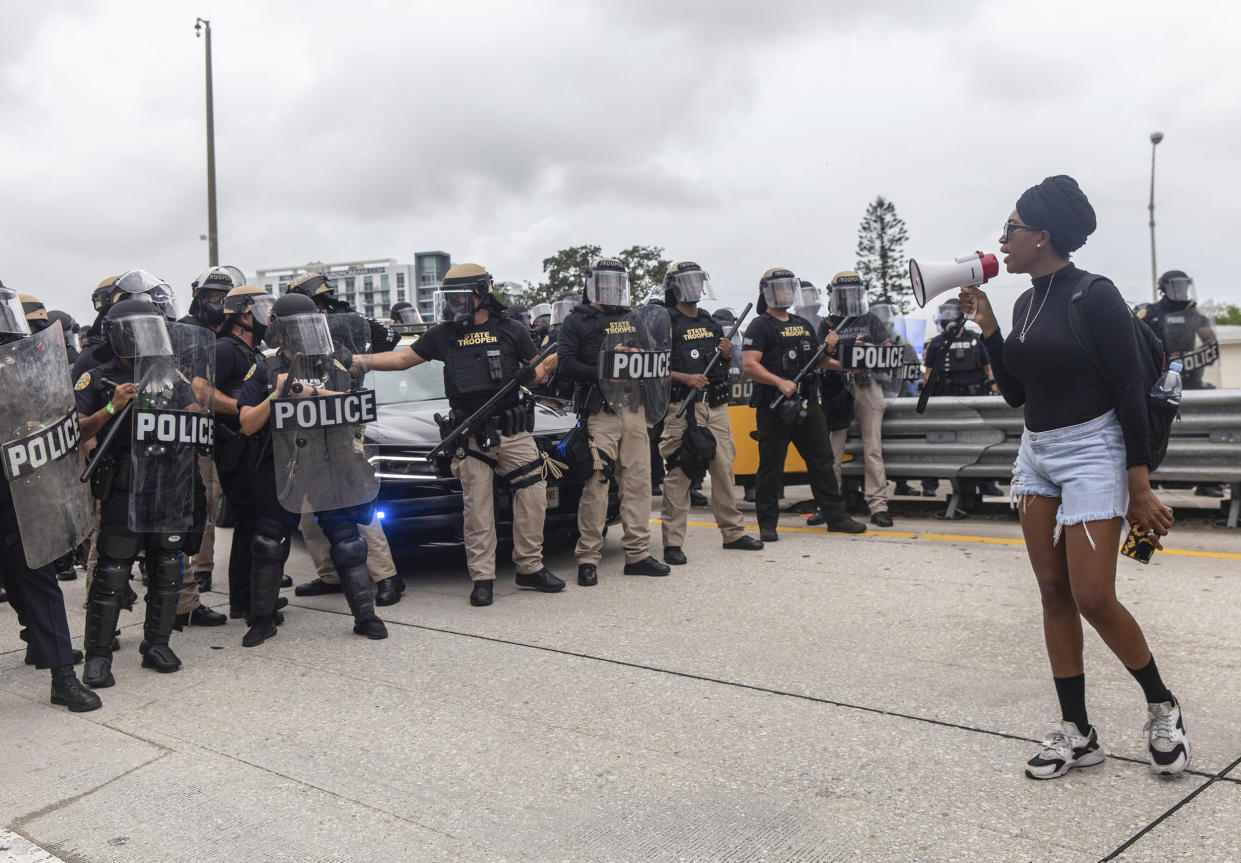Activists, lawyers see 'double standard' in Florida's response to Cuba demonstrations
When demonstrators took to the streets of Florida this week to show solidarity with anti-government protesters in Cuba, shutting down a major stretch of an expressway and blocking streets in cities across the state, some eyes turned to Gov. Ron DeSantis.
DeSantis, a possible contender for the Republican presidential nomination in 2024, signed into law a measure that ramps up penalties against demonstrators this year — including a provision that makes it a felony to jam some roadways during protests.
HB 1, dubbed the "anti-riot law" by supporters, was introduced during last summer's protests for racial justice in the wake of the death of George Floyd, when some law enforcement officers arrested Black Lives Matter protesters or sprayed them with tear gas.
But as protesters rallied in Miami, Tampa and Orlando this week, officers generally appeared to exercise restraint, reportedly making only a handful of arrests. In the eyes of David Winker, a defense lawyer who has represented Black Lives Matter demonstrators, the double standard was clear.
"I applaud the police for using discretion and not arresting everybody, but I want that same energy carried forward when the protesters have more melanin in their skin," Winker said, adding that he opposes HB 1 and supports the anti-government movement in Cuba.
"The double standard has been exposed because DeSantis specifically mentioned the issue of closing roads" when he signed HB 1 in April, Winker said.
Winker was referring to DeSantis' vow that there would be "swift penalties" for protesters who shut down traffic.
"You're driving home from work and all of a sudden you have people out there shutting down a highway," DeSantis said. "We made sure that didn't happen in Florida. They start doing that, and there needs to be swift penalties. That's something that just cannot happen."

The text of the law itself, formally known as the Combating Public Disorder Act, prohibits people from "willfully obstructing the free, convenient, and normal use of any public street, highway, or road" and makes violators subject to $15 traffic citations.
The law includes other measures that have drawn criticism in Florida, including boosted penalties against demonstrators who turn violent and new criminal penalties for those who organize demonstrations that get out of hand.
HB 1 also grants legal immunity to people who drive through protesters blocking roads.
The American Civil Liberties Union has condemned HB 1. In a statement in April, Micah Kubic, the executive director of the organization's Florida chapter, excoriated what he said were the true motivations behind the law.
"Let's be clear: this is not an anti-riot bill, regardless of what supporters claim. It is a bill that criminalizes peaceful protest, and the impact HB1 will have on Floridians cannot be disputed. Each and every provision harkens back to Jim Crow," Kubic said..
The anti-government movement in Cuba, driven in part by fury over poor economic conditions, has in recent days riveted much of Florida, which is home to a large and vibrant Cuban population that traditionally sides with the Republican Party in presidential elections.
The demonstrations over Cuba have not been entirely calm. Tampa police arrested three men involved in a demonstration at Al Lopez Park, two of whom were charged with battery on a law enforcement officer, according to a police statement.
In remarks from Miami on Tuesday, DeSantis appeared to dismiss comparisons between the movement for Black lives and the demonstrations over the situation in Cuba.
"These are people that are rebelling against a communist dictatorship," DeSantis said, adding that the demonstrations across Miami were "fundamentally different than what we saw last summer."
But some Floridians linked with the Black Lives Matter movement say DeSantis' public rhetoric is an example of hypocrisy.
"When they protest for regime change, which aligns with the governor's political viewpoint ... you see no enforcement from law enforcement," Michael Sampson, who co-founded the Jacksonville Community Action Committee, told The Associated Press.

"I think it's just downright hypocrisy we're seeing from the governor and even law enforcement in how they're applying this law. It goes to show how our fears that we had earlier … that it will be used against Black people fighting for equal rights," Sampson said.
DeSantis' spokeswoman, Christine Pushaw, commented in a tweet from her personal account Wednesday.
"The Left and aligned corporate media love authoritarianism. Therefore, they are FURIOUS that the Governor of Florida didn't personally drive 500 miles down the state to arrest people for protesting (not rioting) against the communist regime in Cuba," Pushaw tweeted.
In an email, Pushaw said in part that DeSantis signed HB 1 to "empower law enforcement in their own jurisdictions, giving local and state law enforcement agencies another tool in their toolbox to protect and serve the people of Florida."
"The legislation protects First Amendment freedoms, while ensuring that law enforcement professionals are empowered to use their discretion to maintain public safety," she said. "The Governor has always urged all Floridians exercising their right to protest, to make their voices heard peacefully and lawfully."
She said that blocking or obstructing roadways without a permit "has long been illegal" under Florida law and that law enforcement agencies across the state have "discretion to enforce Florida law in a manner that ensures the safety of all motorists and pedestrians."
State Sen. Shevrin Jones, a Democrat, told The Miami Herald that he believes HB 1 should be repealed.
Jones, who is Black, told the newspaper that the possibility that the law was not being broadly enforced this week indicates that it was "geared toward people who look like me."
The debate parallels the one that followed the U.S. Capitol riots on Jan. 6, when social justice activists questioned whether the law enforcement response would have been the same had the pro-Trump demonstrators predominantly been Black or brown people.
